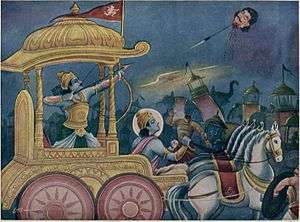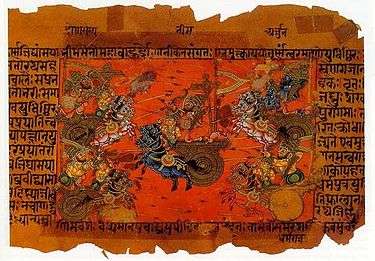Jayadratha

In the epic Mahābhārata, Jayadratha (Sanskrit: जयद्रथ) was the king of Sindhu Kingdom. He was married to Dushala, the only sister of the 100 Kaurava brothers. He was the son of the king Vridhakshtra.
Etymology
The word Jayadratha is derived from two Sanskrit words, jaya meaning 'victorious' and ratha meaning 'chariot'. Thus the word Jayadratha means, 'having victorious chariots'. His other names are-
- Sindhuraja (सिन्धुराज) - king of Sindhu Kingdom
- Saindhava (सैन्धव) - descendant (king) of Sindhu Kingdom
Abduction of Draupadi
One day, during the time the Pandavas were in exile, the Pandavas needed to gather samitha and darbha (holy grass) for rituals and to gather food. They left Draupadi alone at the ashrama and requested Sage Trunabindu to watch over her. On that day Jayadratha saw Draupadi and sent his minister Kotikasya and asked him to inquire as to who she was. Kotikasya went over to her and after learning about her identity, informed Jayadratha that she is Draupadi, the wife of the Pandavas. Jayadratha in spite of learning her identity, went to Draupadi and proposed to marry her. Initially welcoming him as their brother-in-law, Draupadi vehemently refused the proposal. Infuriated, Jayadratha abducted Draupadi and started moving towards his kingdom. The Pandavas returned to their ashrama to find Draupadi missing and learnt about the event that had unfolded by the account of Draupadi's friend Dhaatreyika, who had witnessed Jayadratha forcefully carrying Draupadi away. Yudhishthira then ordered Arjuna and Bhima to rescue Draupadi. Both of them defeated Jayadratha and brought him before Yudhishthira. Draupadi begged for Jayadratha to be pardoned and not killed, in order to prevent Dushala from becoming a widow. She suggested that he be treated like a slave. So, Bhima shaved Jayadratha's head leaving him with just five spots of hair on his head, before setting him free.[1]
The first boon from Shiva
Jayadratha desires to avenge his humiliation from the Pandavas by defeating them in the battle field. So, Jayadratha performs a rigorous tapasya in order to please Lord Shiva. When Lord Shiva appears before him, Jayadratha in turn asks for the ability to defeat the Pandavas. Shiva replies that such a boon is impossible, as the Pandavas are too mighty. However, he gives Jayadratha the ability to check the advance of the Pandavas and their forces for one whole day. However, Shiva warns Jayadratha that Arjuna is an exception to this boon.
The messages of the encounter are manifold. One, that Lord Shiva is known to love all of his devotees equally and does not ignore the tapasya of anyone. Two, that God must return prayer with something. Three, that God, or any giver of boon, should only promise what is within his limits.
The second boon from his father
Years before abdicating his throne, Jayadratha's father, Vridhakshtra, hears a prophecy that his son is going to be killed. Scared for his lineage, Vridhakshtra leaves for the forest and becomes a sage. Through penance, he attempts to gain enough spiritual power to grant his son immortality or the equivalent of Bhishma's boon. However, he only manages enough to curse that whoever causes Jayadratha's head to fall to the ground, his head will turn to hundred pieces.
In the Kurukshetra war
Naturally, Jayadratha fights on the side of Duryodhana in the Kurukshetra War. On the 13th day of the Mahabharata war, when the chakravyuha is launched by Dronacharya, Jayadratha makes use of Lord Shiva's boon. Arjuna's son Abhimanyu manages to enter the formation; he intends for the Pandava forces to follow after him and smash the formation from the inside. Jayadratha moves to close the gap, and is able to hold all the Pandava brothers and their forces at bay. As part of Drona's strategy, Arjuna and Krishna are busy battling Susharma and the Trigata Army elsewhere. Abhimanyu, who does not know how to exit from the chakravyuha, is trapped and brutally killed by the Kaurava Warriors in a combined attack.
The Pandavas are startled after finding that Jayadratha was able to hold the world's most powerful warriors at bay. In particular, Draupadi, Yudhishthira, and Bhima feel very guilty for not killing Jayadratha when they did have the chance. Arjuna blames Jayadratha to be the cause for Abhimanyu's death. He vows to kill him the very next day before sunset, failing which Arjuna would kill himself by jumping in a pyre of fire. This sets the stage for the epic 14th day of battle.
Arjuna's revenge
Dronacharya arranges a combination of 3 vyuhas in order to protect Jayadratha from Arjuna.

Bhima, Satyaki and Arjuna tear through the Kaurava army. At a climactic moment, with the sun nearly set and thousands of warriors still between Arjuna and Jayadratha, Krishna sends his Sudarshana Chakra in order to mask the sun and create an illusion of sunset. The Kaurava warriors rejoice over Arjuna's defeat and look forward for his imminent suicide. Jayadratha was hiding behind Duryodhana, relieved that he was saved. Suddenly the sun was free from the eclipse and Krishna tells Arjuna, pointing at the sun that the sun had not set, but it was only a solar eclipse.He then pointed at the hiding Jayadratha. Arjuna then quickly picked up his Gandiva and shot a pashupatastra at Jayadratha.Jayadratha's head than flew away very far and landed on lap of his father, Vridhakshatra.
His father, being a sage had granted him a boon that whosoever will be responsible for his son's death, his head will be burst into 100 pieces. Therefore, his father too died at the same moment.
Aftermath
After the war, Arjuna fights with the Sindhu Kingdom army when it refuses to honor Yudhishthira as the Emperor of Bharatvarsha. When Dushala (his cousin) comes and begs to spare the life of her son Suratha's son, Arjuna complies.
Notes and references
- Mahabharata by C Rajagopalachari. 2008 (52nd) Edition by Bhavan's Book University. ISBN 81-7276-368-9
The reference from the:
- Mahabharata book is prefixed by ''Mahabharata''
See also
- Mahabharata (1999) by Krishna Dharma
- Hindu mythology, Wars of Hindu mythology

